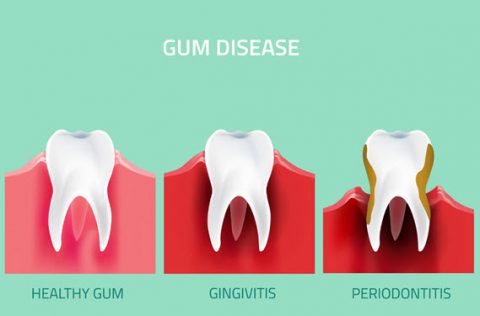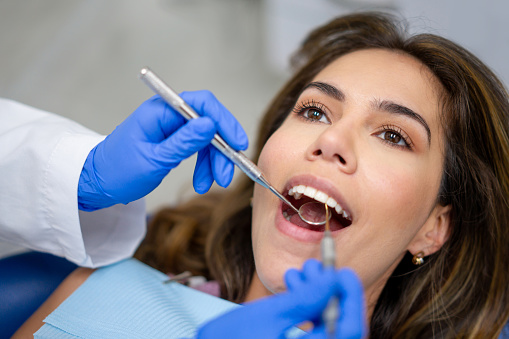Stroke – every four minutes, someone in the US dies from it! As we learn more and more about how our oral health impacts our overall health, we couldn’t help but wonder if there is a relationship between stroke and oral health.
Understanding Stroke
To understand the connection between stroke and oral health one must first understand what a stroke is and who is at a higher risk of having one. A stroke occurs when a blood vessel in the brain bursts, or a blood clot stops oxygen from getting to the brain. Someone who is experiencing a stroke will show physical signs which may include a drooping face, arm weakness, or slurred or impaired speech. While a stroke can occur in people of all ages, there are specific groups of people at greater risk:
- People 65+ – the risk of stroke increases with age with the majority of stroke victims being age 65 or older.
- African Americans – have twice the risk of stroke than Caucasians and are the group most likely to die from stroke
- Those making poor lifestyle choices – sedentary lifestyle, smoking, obesity, and the diseases that can result from them (like high blood pressure, high cholesterol and diabetes) have been found to cause stroke.
Recent studies have found patients who have had a stroke generally had poor oral hygiene practices and oral health. Unfortunately, poor oral health generally results in the development of gum disease.
Understanding Gum Disease
Gum disease affects more than 64 million Americans – that’s nearly half of the adult population! It is a completely preventable disease, created from the overgrowth of bacteria in the mouth. Characterized by red, swollen gums that have pulled away from the tooth and easily bleed, gum disease has multiple stages and can many times be slowed with proper treatment.
The best way to avoid gum disease is to keep up with good oral health care practices and following your dentist’s recommendations: brushing twice a day, using floss and mouthwash daily, chewing sugar-free gum between meals when brushing isn’t an option, and seeing your dentist at least twice a year for regular check-ups.
So, just how are stroke and gum disease connected?

The Connection Between Gum Disease and Stroke
The major link between gum disease and stroke is inflammation. The abundance of bacteria associated with gum disease is an infection of the mouth. Unfortunately, this bacterial infection can get in the bloodstream, causing inflammation making blood more likely to clot, leading to a stroke.
There is a well-established connection between gum disease (periodontal disease) and stroke. Gum disease is a chronic inflammatory condition that affects the tissues and bones surrounding teeth. When left untreated, it can lead to tooth loss and other health problems.
Research suggests that gum disease may increase the risk of stroke. Inflammation caused by gum disease can contribute to the development of atherosclerosis, a condition in which the arteries become narrowed due to a buildup of plaque. This narrowing can cause blood clots to form, which can travel to the brain and cause a stroke.
Furthermore, the bacteria that cause gum disease can also enter the bloodstream and travel to other parts of the body, including the brain, where they can cause inflammation and damage blood vessels.
Studies have found that people with gum disease are more likely to have a stroke or transient ischemic attack (TIA), also known as a mini-stroke. In fact, one study found that people with gum disease were twice as likely to have a stroke compared to those without gum disease.
It is important to note that gum disease is a preventable and treatable condition. Maintaining good oral hygiene, such as brushing twice a day and flossing daily, can help prevent gum disease. If you have signs of gum disease, such as swollen or bleeding gums, it is important to see a dentist for treatment. Treating gum disease may not only improve your oral health but also reduce your risk of stroke and other health problems.
Stroke and Oral Health
Because many Americans are impacted by both gum disease and stroke it’s important to understand the risks and ways to prevent them both. It is more important than ever to stay on top of good oral care practices if you or a loved one has experienced a stroke. Patients who have suffered a stroke may need support in maintaining good oral health care, especially if they have cognitive or physical limitations which prevent them from remembering to complete or performing the tasks properly.
There is a two-way relationship between stroke and oral health. On one hand, poor oral health, such as gum disease, can increase the risk of stroke. On the other hand, stroke can also affect oral health.
As mentioned earlier, gum disease can increase the risk of stroke by causing inflammation and contributing to the development of atherosclerosis. Additionally, the bacteria that cause gum disease can also enter the bloodstream and travel to other parts of the body, including the brain, where they can cause inflammation and damage blood vessels.
Moreover, stroke can also affect oral health. A stroke can cause physical disabilities, such as paralysis or weakness in the face, tongue, or jaw muscles, which can make it difficult to maintain good oral hygiene. As a result, stroke survivors may be at a higher risk for oral health problems, such as tooth decay, gum disease, and oral infections.
Furthermore, stroke survivors may also experience dry mouth, which is a condition in which the mouth does not produce enough saliva. Saliva helps to neutralize acids produced by bacteria in the mouth and wash away food particles, so a decrease in saliva production can increase the risk of tooth decay and gum disease.
It is important for stroke survivors to maintain good oral hygiene and see a dentist regularly for check-ups and cleanings. Stroke survivors may also benefit from working with a speech therapist or occupational therapist to improve their ability to perform daily activities, such as brushing and flossing, as well as from using special tools or devices to help with oral care.
By taking preventive measures against gum disease with good oral care habits, you are also lowering your risk for stroke and several other diseases. The PERFECT TEETH team is here to help support your efforts.


